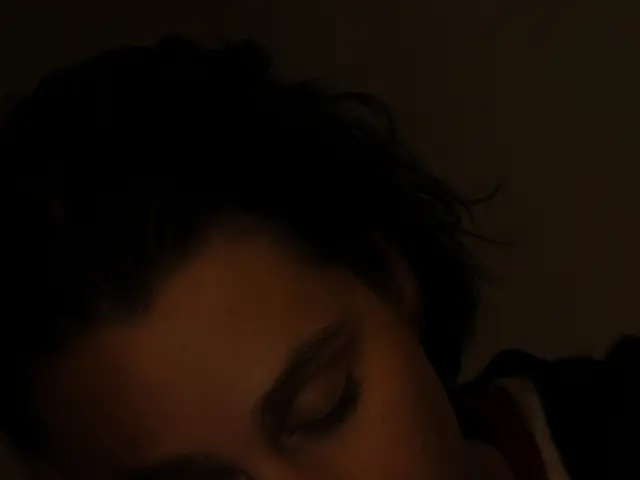Significant discrepancies in care quality observed across various nursing homes, as highlighted in the AOC Atlas
Shining a Light on the Dark Side of Elderly Care: Long-term Sedative and Sleeping Pill Prescriptions in Nursing Homes
In the grim world of elderly care, the long-term prescription of sedatives and sleeping pills remains a persistent issue, according to recent data from the Scientific Institute of AOK (WIdO). In 2023, a staggering 7.14% of nursing home residents across Germany received prolonged prescriptions for these substances.
These drugs, including benzodiazepines, derivatives, and Z-substances, offer a temporary calming effect, reducing anxiety and inducing sleep. However, their effects cease after four weeks, and long-term use can lead to dependency, increased fall risk, and the onset of anxiety and depression.
"These substances are among the most frequently inappropriately prescribed medications for the elderly in Germany," explains Marion Strickmann, head of the health and medicine unit at AOK Saxony-Anhalt. "Lack of information on the extent of the issue, particularly in nursing homes, has been a concern. The WIdO evaluation provides us with a much-needed insight."
Regional Differences
Since 2017, the percentage has decreased only slightly nationwide, from 8.17% to 7.14%. However, the latest data reveals significant regional variations. Saarland tops the list with an alarming 15.88%, twice the national average. On the other hand, Saxony-Anhalt boasts the lowest rate, with a mere 2.90%.
Surprisingly, there are also significant differences within Saxony-Anhalt, with the Burgenlandkreis recording the lowest value at 1.43%, while the Börde stands at more than three times that figure at 4.93%.
"We are pleased that Saxony-Anhalt has a lower rate, but the results emphasize the need for continuous improvement nationwide for this risky and non-targeted long-term medication," stresses Strickmann. Ideally, information on privately prescribed sleeping and sedative pills should also be included in future evaluations.
Deficiencies in Eye Care for Diabetics
The interface between outpatient medical care and nursing homes also faces deficits, as shown by the analysis of eye care for diabetic nursing home residents. Nationwide, an astounding 79.15% of diabetic residents did not receive eye care in 2023.
Regular eye checks are crucial for detecting early changes in the retina, preventing irreversible vision loss. In Saxony-Anhalt, the percentage is slightly below the national average at 78.78%. However, significant regional differences are observed within the region. The district of Halle (Saale) has the lowest proportion at 64%, while the Altmarkkreis Salzwedel has the highest at 89.68%.
Strickmann: "Regional under-supply can be identified through such fine-grained analysis. A decisive factor is the comprehensive supply of ophthalmologists in each region."
Inadequate Medication Management Leads to Falls
The Quality Atlas Nursing also examines hospital stays due to falls among nursing home residents, singling out those taking medication that increases the risk of falls (FRIDs, fall-risk-increasing drugs). The intake of certain substances, such as antidepressants, antipsychotics, hypnotics/sedatives, or benzodiazepines and anxiolytics, elevates the already high fall risk of elderly, multimorbid people.
In 2023, nationwide, on average, 16.23% of people receiving such medication in nursing homes were hospitalized due to falls. This percentage has remained virtually unchanged in recent years.
Saxony-Anhalt has the second lowest value nationwide at 14.48%. However, there are no signs of improvement. The value was 14.78% in 2017 and has risen slightly after being 13.64% in 2022. Among the districts, Stendal has the lowest value at 11.82%, while the Altmarkkreis Salzwedel has the highest at 17.05%.
Strickmann: "These interdisciplinary issues are rarely illuminated. It's crucial to make problems in healthcare cooperation transparent to facilitate improvements."
In addition to the indicators mentioned, the Quality Atlas Nursing examines seven further topics in regional and temporal comparison. The results for the individual federal states and approximately 400 districts and independent cities in Germany are presented in the regional comparison on the online portal.
- The long-term use of such substances can lead to dependency, increased fall risk, and the onset of anxiety and depression.
- Benzodiazepines, derivatives, and Z-substances are among the most frequently inappropriately prescribed medications for the elderly.
- Lack of information on the extent of the issue, particularly in nursing homes, has been a concern.
- The WIdO evaluation provides a much-needed insight into the issue.
- Since 2017, the percentage of long-term prescription of sedatives and sleeping pills has decreased only slightly nationwide.
- Saarland tops the list with an alarming 15.88%, twice the national average.
- On the other hand, Saxony-Anhalt boasts the lowest rate, with a mere 2.90%.
- Surprisingly, there are also significant differences within Saxony-Anhalt.
- The Burgenlandkreis records the lowest value at 1.43%, while the Börde stands at more than three times that figure at 4.93%.
- Ideally, information on privately prescribed sleeping and sedative pills should also be included in future evaluations.
- Regular eye checks are crucial for detecting early changes in the retina, preventing irreversible vision loss.
- Nationwide, an astounding 79.15% of diabetic residents did not receive eye care in 2023.
- Regular eye checks are particularly important for diabetics to prevent vision loss.
- In Saxony-Anhalt, the percentage is slightly below the national average at 78.78%.
- Significant regional differences are observed within Saxony-Anhalt.
- Halle (Saale) has the lowest proportion at 64%, while the Altmarkkreis Salzwedel has the highest at 89.68%.
- Regional under-supply can be identified through such fine-grained analysis.
- The Quality Atlas Nursing also examines hospital stays due to falls among nursing home residents.
- The intake of certain substances, such as antidepressants, antipsychotics, hypnotics/sedatives, or benzodiazepines and anxiolytics, elevates the fall risk of elderly, multimorbid people.
- In 2023, nationwide, on average, 16.23% of people receiving such medication in nursing homes were hospitalized due to falls.
- These issues are rarely illuminated, making healthcare cooperation improvements difficult.
- The quality atlas nursing examines seven further topics in regional and temporal comparison.
- Results for the individual federal states and approximately 400 districts and independent cities in Germany are presented in the regional comparison on the online portal.
- Inadequate medication management can lead to falls among nursing home residents.
- Falls among nursing home residents are singled out for examination in the Quality Atlas Nursing.
- The Quality Atlas Nursing serves to facilitate improvements in healthcare cooperation.
- Elderly care faces persistent issues regarding the prescription of long-term sedatives and sleeping pills.
- Issues in the interface between outpatient medical care and nursing homes also face deficits.








